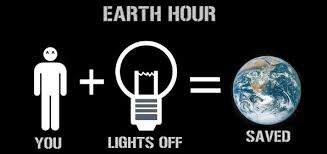Earth Hour!
Join us and millions of people around the world, today Saturday 19 March 2016, to highlight the urgent need to address climate change!
Take initiative and encourage your family and friends to switch off their lights for Earth Hour at 8.30 and make a commitment to an action that benefits the planet beyond the hour.
h
Earth Hour began in Sydney, Australia – in 2007 and has since grown into a global movement with hundreds of millions of people across every continent switching off their lights for Earth Hour, creating history as the world’s greatest ever environmental action.
How does climate change affect our oceans?
Much attention has been focused on the effects of climate change on forests, farms, freshwater sources and the economy. But what about the ocean?
For decades, the ocean has been absorbing carbon dioxide dumped into the atmosphere by burning fossil fuels. It has also absorbed a lot of the extra heat produced by atmospheric carbon dioxide levels.
h
So, Here are five ways these warmer temperatures are affecting our oceans:
- Coral bleaching
Mass coral bleaching results in the starvation and death of the corals that support the thousands of species that live on coral reefs.
- Fish migration
Many fish species have moved toward the poles in response to ocean warming, disrupting fisheries around the world.
- Drowning wetlands
Rising sea levels, partly the result of heat absorbed by the ocean, is also “drowning” wetlands. Wetlands normally grow vertically fast enough to keep up with sea level rise, but recently the sea has been rising too fast for wetlands to keep their blades above water.
- Ocean acidification
This is damaging many ocean species that use calcium carbonate to form their skeletons and shells. Studies have shown that calcium carbonate formation is disrupted if water becomes too acidic.
- A disastrous positive feedback loop
Acidification also appears to be reducing the amount of sulfur flowing out of the ocean into the atmosphere. This reduces reflection of solar radiation back into space, resulting in even more warming.
This is the kind of positive feedback loop that could result in run-away climate change
By taking part in this global event your actions will benefit the planet in the year ahead.
If you want to know more read and get involved by supporting Earth Hour projects around the world, at www.earthhour.org.



